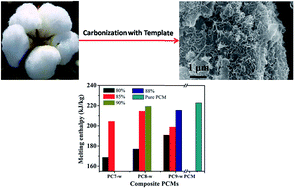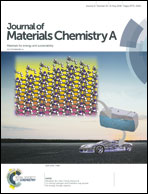Synthesis of porous carbon from cotton using an Mg(OH)2 template for form-stabilized phase change materials with high encapsulation capacity, transition enthalpy and reliability†
Abstract
Owing to the inherently low thermal transport performance and stability along with leakage of organic phase change materials (PCMs), porous carbon-stabilized PCMs were designed via a facile solution impregnation method. Porous carbon materials with some graphitic characteristics, high specific surface areas and large mesopore proportions were synthesized from sustainable and commercially available dewaxed cotton using Mg(OH)2 created from MgO precursor, and they exhibited a fine framework structure with considerable volumetric expansion after acid leaching relative to the carbon materials prepared without a template. In addition, 1-hexadecanol was used as PCM in composite materials for energy storage application. The supporting materials derived from a carbonization temperatures of 700 °C, 800 °C and 900 °C exhibited large PCM encapsulation capacities up to 85%, 90% and 88%, respectively, and the corresponding transition enthalpy values were 107.9%, 109.4%, and 109.8% higher than that of expected storage capacity of composite PCMs. Meanwhile, the as-prepared composites revealed improved thermal conductivity and thermal stability without any seepage above the pure PCM melting temperature. Factors including the graphitic characteristics, specific surface areas, interconnected pores and reversible hydrogen bonding played a pivotal role for the improved thermal performance of the composite materials. In addition, the composites showed high cycling performance after 200 cycles of melting/crystallization without any significant change in the transition enthalpy, and they also exhibited improvement in the extent of supercooling phenomenon, which is promising for large-scale applications.



 Please wait while we load your content...
Please wait while we load your content...